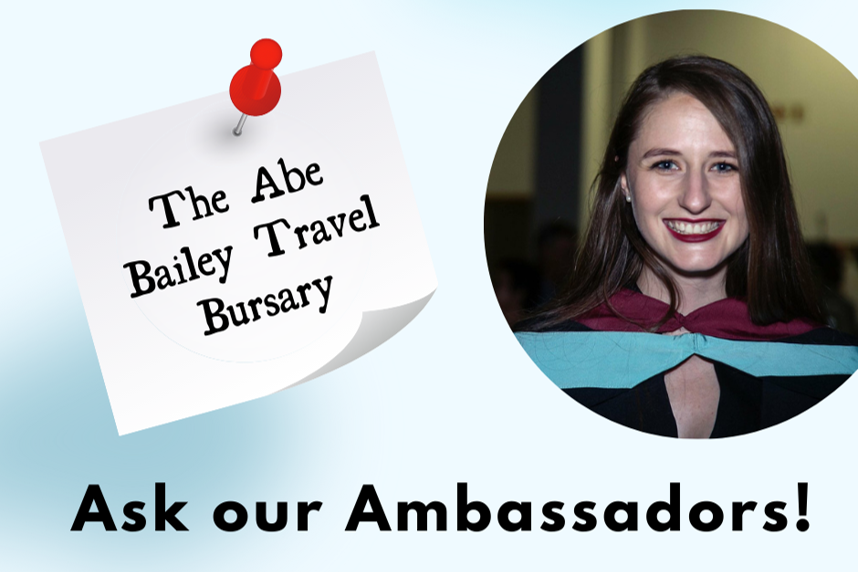
In our new ‘Ambassador Advice’ series, our Africademics Scholarship Ambassadors share their experience and advice for scholarship applicants in and from Africa. This week Lize-Mari Doubell from South Africa, a Master’s graduate in Law from the University of Stellenbosch and recipient of the Abe Bailey Travel Bursary, introduces the programme and shares valuable tips for future applicants.
About the Bursary
The Abe Bailey Travel Bursary is an experience which stretched and challenged my very understanding of travel. I was fortunate enough to be awarded this travel bursary at the end of 2017 and represented Stellenbosch University. The travel bursary is awarded to one student or junior lecturer from every South African tertiary institution. In 2017, we were a group of 18 diverse students from across South Africa who formed part of the group.
Once selected, you travel with the group (as well as the tour leader) to Addis Ababa in Ethiopia and London, Oxford, Cambridge and Edinburgh in the United Kingdom during November/ December of the given year. The bursary covers all costs involved for the three week experience. As part of the programme, recipients visit the African Union headquarters in Addis Ababa, and are able to personally engage with dignitaries and leaders on issues currently facing the continent.
In the United Kingdom, we have a fully packed programme where we meet with politicians, ministers, the South African High Commission, financial executives and academic staff and students (at the University of Oxford and the University of Cambridge). There are also opportunities to watch theatre productions and performances at the West End and the Royal Albert Hall.
We also spent a large part of the time touring and getting to know the United Kingdom. The purpose of the travel bursary is to encourage greater co-operation within a diverse group, facilitate vigorous debate, foster commitment in a common future, and to grant exceptional South Africans the opportunity to travel and engage in a holistic, interactive programme. Recipients are selected based on leadership capabilities, service recognition, strong academic performance, as well as a future-focused desire to positively develop South Africa.
The travel bursary was established in terms of the will of the late Sir Abe Bailey. The trustees of the Abe Bailey Trust then avail these funds for the selected students to travel as a group. Since its inception, the selection criteria of those applying have drastically changed. The trust now makes provision for a diverse group to apply and be selected to take part in this unique programme.
The Application Process
Due to the multiple steps of the application process, the applications usually open early in the year. The process differs slightly from year to year, as well as from university to university, however, you are generally required to send in a motivational letter, CV, reference letters, and full academic transcript to be considered. Your application documents need to address the objectives of the travel bursary and why you would make a good candidate. Candidates will then be shortlisted and invited to an interview at their university.
Each tertiary institution conducts their own interviews and then selects their top three candidates. The names, as well as all supporting documentation of these top three candidates are then sent to the trustees of the Abe Bailey Trust. The trustees then consider all the applications from around the country and select one person from each institution to form part of the group. This is done to ensure that the final group is dynamic and diverse.
At Stellenbosch University, all applications are facilitated through the Frederik van Zyl Slabbert Institute for Student Leadership Development. Prospective applicants can also receive support regarding the application process at the institute.
Personal Experience and Advice
I had applied for the Abe Bailey Travel Bursary in 2016 and in 2017, and I was successful the second year I applied. Students who had been awarded the travel bursary in the past told me about how the programme had shifted their perspective of travel and experiencing new cultures.
I was eager to travel and participate in such an interactive programme. Having applied for the programme twice, I learned that there aren’t specific requirements and “check-box” criteria that have to be met. Instead, the trustees are looking for young people who are truly committed to the ideals of an united and engaged South African youth (as well as ready to face the challenges that come with working towards that ideal). In my second year that I applied, I had greater experience as a student leader on campus, and I had worked as a facilitator in multiple cross-cultural student workshops and engagements. These all contributed to making me a better candidate than what I was in 2016 when I first applied.
Through the experience with the Abe Bailey Travel Bursary, I developed a better understanding of how travel is able to manipulate the way you see the world and its people. I was able to engage with highly successful and prominent figures in the United Kingdom about South Africa’s place in the world and how the global north interacts with the global south. At the African Union, I was granted the opportunity to discuss Africa’s development with influential African leaders. I further engaged with the notion of pan-Africanism and contributed to robust debates.
This programme, and the people I met along the way, shaped the leader I am today. Together, our group laughed, cried, debated, and stayed up late many evenings trying to solve the world’s problems. I encourage all eligible students and junior lecturers in South Africa to investigate the Abe Bailey Travel Bursary further, and form part of a group who are actively working towards making our country a just and united place to live.
You can discover more about the Abe Bailey Travel Bursary here: http://www.abebailey.org/travel/
